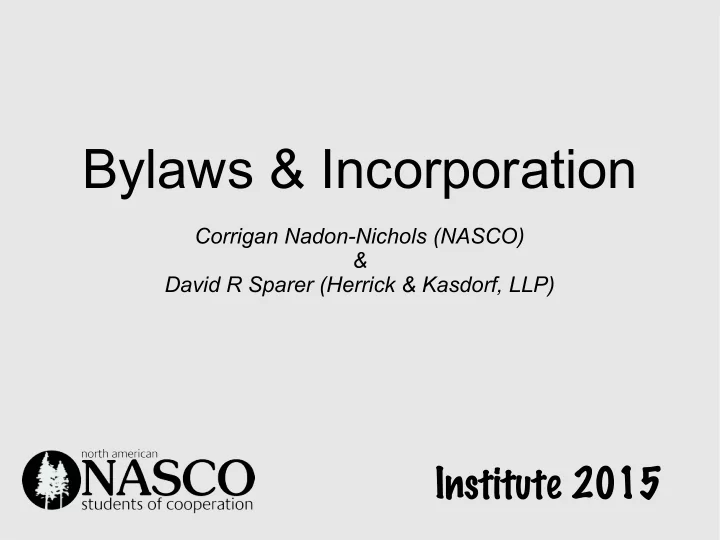

Bylaws & Incorporation Corrigan Nadon-Nichols (NASCO) & David R Sparer (Herrick & Kasdorf, LLP) Institute 2015
Overview Benefits of Incorporation for Co-ops Pro's and Con's of different corporate forms Articles of Incorporation How to Draft Bylaws Not Included How to get Tax Exemption Specific advice for your state AA batteries Actual Legal Advice – get your own attorney!
What is a Corporation? A legal entity defined by state laws. A number of people (or other entities) can share in the ownership. Shareholders/members can share ownership while limiting their individual financial liability. Bylaws define rights and responsibilities of members. The Bylaws are an agreement among members that doesn't change as members come and go.
A Legal Entity Created by filing “Articles of Incorporation” with a state office i.e. in MI: Dept. of Licensing and Regulatory Affairs Can enter into binding contracts with other entities Can own assets, employ employees, be party to legal actions Other legal rights generally afforded to persons Thanks, Citizens United...
Articles of Incorporation
Boards, Offcers, Directors Board of Directors makes decisions for a corporation Officers can act on behalf of a corporation The limits of authority for Directors and Officers is defined in Bylaws and Policies. Directors and Officers are not liable for corporate debts or torts. (usually!)
Exceptions to Director Protection Negligence (Duty of Care) in good faith, in the best interest of the corporation with the care that ordinarily prudent persons in a similar position would exercise in similar circumstances. Payroll and Sales Tax Fraud Direct Supervision (“Vicarious Liability”) Tort claims by the corporation/membership Directors & Officers Insurance
Specifc Benefts for Housing Co-op Can have members sign enforceable lease/member agreements with the co-op Can put bills, utilities in the co-op's name. Individual members not liable. Protect the democratic rights of members Put property and mortgage in name of co-op
Why Not Incorporate? Loss of individual control Project becomes a separate legal entity, subject to bylaws, director elections, etc. Corporate taxation (unless exempt) Taxed on “profits”. Accounting matters. Member patronage exemptions (Schedule T) Costs: filing fees, tax prep, record keeping “Owner-Occupied” Benefits Taxes (property exemptions?, personal interest/tax deductions?) Loan terms Zoning/Licensing
Types of Corporations C-Corp / S-Corp Profit / Non-profit Stock / Non-Stock Membership / Directorship Cooperative B Corp LLC?
Pause For Questions ?
Bylaws! Define the financial and fiduciary relationships between members, directors, and officers. Define decision making processes: Who, How, What General Membership Board Semi-autonomous sub-groups (Houses) Define how to amend the bylaws.
Who Cares About Your Bylaws? State Courts If there is a legal action about control of the co-op. The IRS & local tax agencies If you apply for tax-exemption. Prospective Members If they care about democracy. Lenders & Funders To understand your structure To verify that it really is a co-op
Key Parts of the Bylaws Membership Board of Directors Officers Member Equity/Patronage Financial Restrictions Amending the Bylaws
Membership Elligibility Process for Acceptance Rights & Responsibilities Process for Termination
Board of Directors Process for Election Terms of Office Process for Removal Meetings Frequency, or authority to call Notice of Meetings Quorum Voting Rules Restrictions on Powers
Offcers Typically: President, Treasurer, Secretary Duties and Powers Election Term of Office Removal
Member Equity Amount Required Allowance for increases or decreases Process for pay-out
Financial Restrictions If not-for-profit, restrictions on: Private gain Sale of assets Disposition of assets when dissolving Specific rules for decisions on: Purchasing real property Taking on debt
Amending the Bylaws Who can amend Process for proposal and decision
What's Wrong With These Bylaws?
Highlight Reel Incorporation is necessary for giving a co-op an independent, legal existance. Incorporation protects individuals. Most housing co-ops use: Nonprofit, membership, C-Corp “cooperative”, if applicable Equity $0 or appreciation is limited. Bylaws are not too scary.
Recommend
More recommend